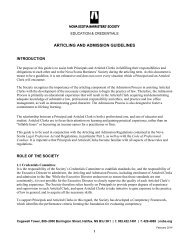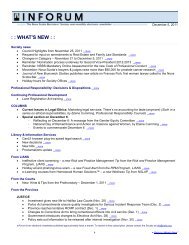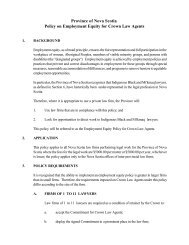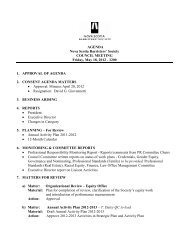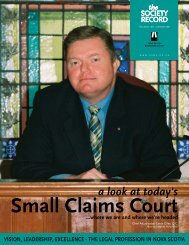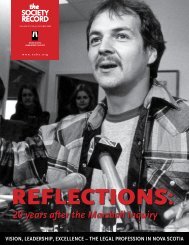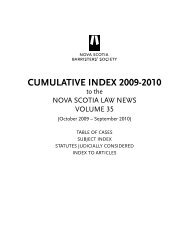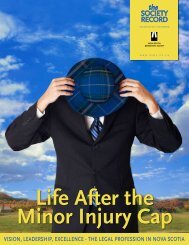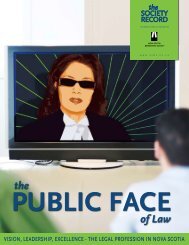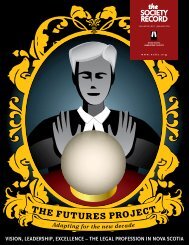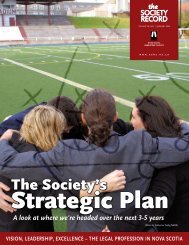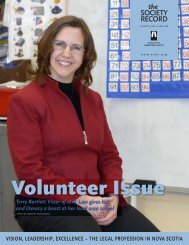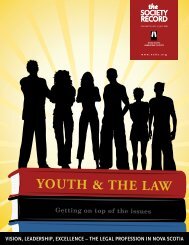fostering employment equity and diversity in the nova scotia legal
fostering employment equity and diversity in the nova scotia legal
fostering employment equity and diversity in the nova scotia legal
Create successful ePaper yourself
Turn your PDF publications into a flip-book with our unique Google optimized e-Paper software.
TALKING ABOUT DIVERSITY AND RACISM<br />
The members of <strong>the</strong> <strong>employment</strong> <strong>equity</strong> committee represent a microcosm of <strong>the</strong> Nova Scotia<br />
<strong>legal</strong> community. The committee consists of members of <strong>the</strong> private bar, academics, government<br />
lawyers, law students, senior counsel, African Canadians, First Nations <strong>and</strong> article clerks. It soon<br />
became evident that <strong>the</strong> members came to <strong>the</strong> committee with diverse views <strong>and</strong> vary<strong>in</strong>g levels of<br />
underst<strong>and</strong><strong>in</strong>g, knowledge <strong>and</strong> experience of <strong>employment</strong> <strong>equity</strong>.<br />
Talk<strong>in</strong>g about <strong>diversity</strong> <strong>and</strong> racism is not an easy task, particularly <strong>in</strong> a group that consists of<br />
people of o<strong>the</strong>r races, classes, gender <strong>and</strong> status. But if progress is to be made we must learn to<br />
discuss race openly <strong>and</strong> effectively <strong>in</strong> order to collaborate <strong>in</strong> programs <strong>and</strong> <strong>in</strong>itiatives that will<br />
make our <strong>in</strong>creas<strong>in</strong>gly ethnic diverse society productive <strong>and</strong> functional.<br />
As difficult as some may f<strong>in</strong>d it to talk about race it is equally true that it is often just as difficult<br />
to listen. The difficulty is sometimes due to <strong>the</strong> fact that we do not wish to listen or perhaps we<br />
do not know how to listen. Attempts at conversation often produce discomfort, heated<br />
<strong>in</strong>teractions <strong>and</strong> patterns of attack <strong>and</strong> defense that deteriorate <strong>in</strong>to debate <strong>and</strong> argument ra<strong>the</strong>r<br />
than dialogue.<br />
Talk<strong>in</strong>g about race forces us to look at ourselves, our own prejudices, privileges <strong>and</strong> suffer<strong>in</strong>g. As<br />
well, we br<strong>in</strong>g to <strong>the</strong> table different levels of underst<strong>and</strong><strong>in</strong>g or <strong>in</strong>formation about race <strong>and</strong> racism.<br />
We are sometimes reluctant to talk about race because of <strong>the</strong> fear of expos<strong>in</strong>g our ignorance or<br />
lack of underst<strong>and</strong><strong>in</strong>g of <strong>the</strong> issues.<br />
Talk alone does not lead to change. The work of <strong>the</strong> committee must lead to action, to well<br />
conceived, well developed <strong>and</strong> well implemented programs that will address <strong>the</strong> systemic<br />
manifestations of racism that exist with<strong>in</strong> <strong>the</strong> <strong>legal</strong> community.<br />
The first step of <strong>the</strong> committee has been to talk <strong>and</strong> learn how to underst<strong>and</strong>, explore <strong>and</strong> deal<br />
with personal <strong>and</strong> <strong>in</strong>stitutional racism <strong>and</strong> to collaborate with <strong>the</strong>ir fellow committee members to<br />
structure guidel<strong>in</strong>es that <strong>in</strong> <strong>the</strong> words of Judge Rosalie Abella constitute a “strategy designed to<br />
obliterate <strong>the</strong> present <strong>and</strong> <strong>the</strong> residual effects of discrim<strong>in</strong>ation <strong>and</strong> to open equitably <strong>the</strong><br />
competition for <strong>employment</strong> opportunities to those arbitrarily excluded. It requires a special blend<br />
of what is necessary, what is fair <strong>and</strong> what is workable.”<br />
If we are to effectively address discrim<strong>in</strong>ation <strong>and</strong> racism we must acknowledge <strong>the</strong>ir long history<br />
<strong>in</strong> language. In this world of politically dom<strong>in</strong>ant <strong>and</strong> sub dom<strong>in</strong>ant peoples <strong>the</strong> language of <strong>the</strong><br />
dom<strong>in</strong>ant or elite will generally hold sway. In his book Elite Discourse <strong>and</strong> Racism, Newbury<br />
Park, CA: Sage, 1993, Teun A. van Dijk, contends that a politically dom<strong>in</strong>ant group’s language<br />
can def<strong>in</strong>e situations <strong>and</strong> impose certa<strong>in</strong> mean<strong>in</strong>gs on situations. Consequently <strong>the</strong> non dom<strong>in</strong>ant<br />
group may unwitt<strong>in</strong>gly f<strong>in</strong>d that it is ensnared <strong>in</strong> language which is pejorative. This occurrence<br />
may lead to loss of self esteem <strong>and</strong> self confidence. Therefore <strong>the</strong> move towards a redef<strong>in</strong>ition of<br />
9



